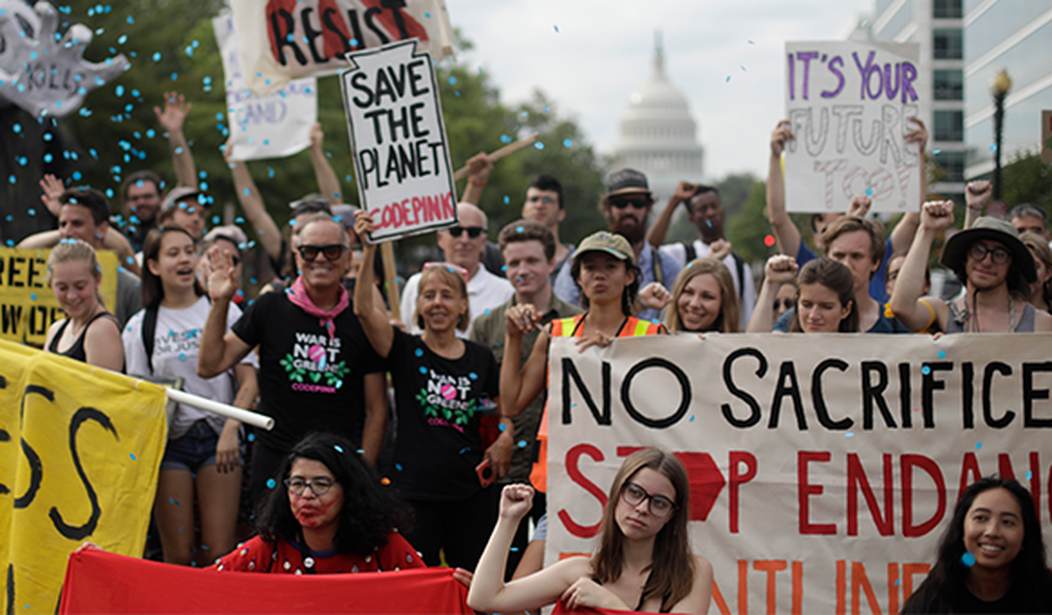In this episode of "The No-Longer-Hallowed Halls of Academia"...
As the left tells us, climate change — AKA "the existential threat to mankind" — is upon us. The planet as we know it could be destroyed at any minute, to hear the likes of Joe Biden and Kamala Harris talk.
But hope remains.
Harvard University now plans to train students to heal the planet; while the Ivy League school is at it, it also plans to cure "structural racism."
The university's Climate Change and Planetary Health concentration (a snooty word for "major"), launching this fall, will help students understand the "consequences of the current planetary health crisis, including the effects on food, water, air, extreme weather events, heat, migration, and political stability and their subsequent impacts on infectious diseases, non-communicable diseases, nutrition, and mental health."
Emphasis, mine:
Students in this concentration will also learn about the health inequity born out of environmental degradation. Structural racism and international economic policy have exacerbated the climate crisis, with communities of color, poor communities, and the Global South being disproportionately impacted. You will be equipped to use research, leadership, advocacy, and policy to implement solutions that better serve these populations.
Professor Christopher Golden told The Harvard Crimson:
The idea is that we move from an understanding of planetary health to training planetary healers. We see climate change as one of the most important existential threats that is affecting public health.
Of course they do.
Like other climate fanatics, Golden's "existential threat" reference is a hyperbolic statement in search of facts. Speaking of which, the Biden-Harris administration in August warned kindergarteners, through NASA's "Climate Change for Kids" website, about the "inescapable death spiral of climate change."
READ MORE:
Biden-Harris Admin. Warns of 'Inescapable Death Spiral' of Climate Change on NASA's Webpage for Kids
The major's learning objectives thusly (emphasis, mine) include:
Interpret foundational science related to climate and environmental change.
- Explain the impact of anthropogenic [human caused] greenhouse gas emissions on global climate (greenhouse effect).
- Describe historical trends and current sources of anthropogenic greenhouse gas emissions and air pollution.
- Understand how human activities impact ecological stability, land use changes, biodiversity, water pollution, deforestation and food systems.
And...
Analyze the historical and structural causes of climate change and ecological degradation and describe the ways in which it creates/exacerbates health inequity.
- Explain how climate change and ecological degradation intersects with structural racism and health equity in the U.S. (e.g. redlining, heat islands, the disproportionate impact on certain populations, intersecting health challenges, access to adaptive and protective measures).
- Define environmental justice and recognize its importance to climate and planetary health solutions.
- Describe impacts of climate change and planetary health on global health inequities (e.g. natural disasters/extreme weather events, forced migration, social instability, political conflict, food security, water scarcity, and sea level rise), including inequitable resource allocation for adaptive responses.
- Identify the ways in which Black and Indigenous people, and people from the Global South contribute to climate and planetary solutions.
Finally:
This is a ten-unit concentration for all degree programs at Harvard Chan School. Students in this concentration will be required to choose one of two tracks (research methodologies or research translation) and take 5 units of core curriculum courses, 2.5 units of track courses, and 2.5 units of elective courses at Harvard Chan School and across Harvard University.
Incidentally, NPR in early September told us about a "new type of chaplain" who is working with people to overcome "climate grief." No, really.
When Diane Ware’s home state of Oregon proposed a natural gas pipeline that threatened local waterways, she sprang into action — leading workshops on lobbying state lawmakers, mentoring student activists and organizing lectures at her church.
But when plans for the pipeline were canceled, Ware, 78, found little pleasure in the victory. The retired elementary school teacher couldn’t shake the feeling that it may be too late to save a planet in deep peril — a prospect tinged with grief, anger and depression. Ware realized she had a case of "climate grief” — and needed help.
Ware is one of a growing number of people using the services of an eco-chaplain, a new kind of spiritual adviser rising among clergy trained in handling grief and other difficult emotions.
Ware told NPR she was "fried."
I just thought how on Earth are we ever going to get this problem solved if we can’t even talk about it and get good information from the newspapers that we think are the guardians of truth? And then I just thought, ‘Wow, I am fried.'
No word if Ms. Ware's adventure into "eco-chaplaincy," which, of course, is not universally recognized, has "un-fried" her or not.
ALSO READ:
'Global Warming' Alarmist Al Gore All in for 'Climate Champion' Kamala Harris
Because of Course He Is
ABC 'Climate Change' Alarmists Pathetically Push 'Eco Anxiety' as
Life-Threatening Mental Illness
NBC Can't Understand Why 'Average Person' Doesn't Fear 'Climate Crisis'
– Should We Tell 'Em?
Meanwhile, Harvard, via indoctrinated students, is determined to save the world from "all of the above."















